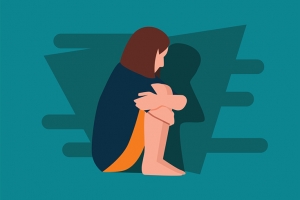How You Can Support Your Socially Anxious Child: Adjusting to In-Person Interactions
For many children and adolescents who struggle with social anxiety, the thought of returning to school and other in-person interactions has triggered increased anxiety symptoms. Early on in the pandemic many children and adolescents who struggle with social anxiety may have experienced relief. They may have experienced relief from bullying and social anxiety and may have worried less about their performance and how they are perceived by others. Studies show that some children and adolescents who struggle with social anxiety reported an improvement in their symptoms of anxiety and depression since the start of the pandemic and their ability to attend school and other events remotely. Attending school virtually has decreased unpredictability and uncertainty which is the trigger for anxious symptoms in many children and adolescents. Many children and adolescents have become accustomed to attending school remotely. Therefore, some may be experiencing intensified anxious symptoms as they emotionally prepare to return to in-person school and activities.
What is Social Anxiety?
Social anxiety also referred to as Social Phobia, is a mental health condition where you may suffer from increased anxious symptoms and self-consciousness in social situations. You may experience a persistent fear of social situations and be watched or judged by others. This may affect work, school, and your other everyday activities and functioning. For children the median age of onset is 13-years-old, however, onset can also occur between the ages of 8 and 15-years-old (Psycom.Net).
For children and adolescents who struggle with social anxiety, they may be easily triggered by numerous situations, including engaging in conversations with others, speaking in public, making eye contact, entering rooms, using public restrooms, reading out loud, reading out loud, going to parties, eating in front of other people, starting conversations, and going to school or work. They may experience fearfulness of being judged in social situations or embarrassment, accidentally offending another person, experiencing increased anxious thought processes during conversations, or being the center of attention. Children may experience intensified worries in social situations, including school, play dates, and sports teams.
Those who experience social anxiety may avoid social stimulation and social events engaging in the cycle of avoidance. This can later lead to low self-esteem, poor social skills, depression, and increased negative thought processes.

Social Anxiety can cause many children and adolescents to experience high distress and may harm social relationships, academic performance, self-confidence, and academic performance.
What symptoms do those with Social Anxiety Experience?
Many children who struggle with Social Anxiety experience fear and anxiety manifested as meltdowns/tantrums, clinging, crying, freezing, or refusing to speak (psycom.net). They may also experience several physical symptoms including:
- Rapid heartbeat
- Dizziness/Lightheadedness
- Stomach distress
- Muscle tension
- Inability to catch a breath
- “Out-of-body” sensation/ Disassociation
- Shakiness/Trembling
How you can support your socially anxious child?
Parents can assist children to cope with their Social Anxiety by helping them understand the nature and meaning of their mental illness and coping with their symptoms. Parents and mental health professionals can assist children to make connections between emotional responses, physical symptoms, and triggers to begin learning how to cope. Providing psychoeducation and providing normalcy in how anxiety impacts thinking and behavior can significantly impact the ability to cope with negative emotional experiences.
Helpful Coping Mechanisms for Children and adolescents who Experience Social Anxiety:
- Relaxation Strategies
- The first step is to assist your child to understand physical responses to anxiety within their body and relax to utilize adaptive coping strategies.
- Deep Breathing: Deep breathing has been effectively proven to calm the rapid heart rate and slow down breathing and feelings of dizziness. You can teach your child numerous deep breathing strategies, including ocean breathing, balloon breathing, and deep belly breathing (inhale for 4 seconds, hold, exhale for 6 seconds).
- Progressive Muscle Relaxation: For those who experience intensified anxious responses they may experience tension and stress within their muscles. Progressive Muscle Relaxation teaches children to relax muscles and release tension throughout the body from arms, neck, and shoulders to feet and legs.
- Imagery: As our thoughts have a powerful influence on our feelings guided imagery focusing on a calming environment, such as the beach, mountains, or sky, can significantly reduce intensified anxious symptoms.
- Problem Solving Skills
- Children and adolescents who struggle with social anxiety tend to engage in the cycle of avoidance. This may provide temporary relief, however, may worsen the anxious symptoms over time. Problems solving techniques can assist children to manage feelings of anxiety. Assisting your child to identify triggers that lead to social anxiety in order to discuss problem-solving skills can assist them to work through these anxiety-provoking themes or situations. For example, assisting your children to develop social skills through role-play and modeling can assist them to gain confidence and reduce anxiety symptoms.
- Challenging Anxious Thoughts & Cognitive Reframing
- Children and adolescents who struggle with social anxiety are sometimes overwhelmed with negative core beliefs which magnify anxious thoughts. They may experience anxious thoughts surrounding assuming worst-case scenario, believing that others view them negatively/struggling to differentiate between self-image verse others perceptions, personalization, etc. Therefore, examining evidence of the thoughts can reduce anxious feelings. Teaching children to recognize anxious thoughts, examine the evidence which does not support anxious thoughts, and replacing them with positive thoughts can assist in reducing anxious thoughts and symptoms.
- The first step is to assist your child to understand physical responses to anxiety within their body and relax to utilize adaptive coping strategies.
If you would like personalized support and guidance on how you can support your socially anxious child, please call Specialized Therapy Associates at 201-488-6678 to schedule your complimentary consultation.

